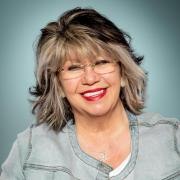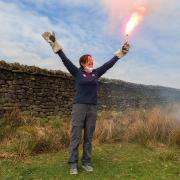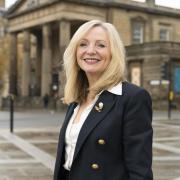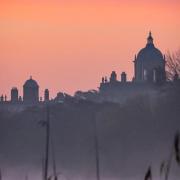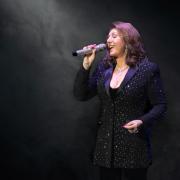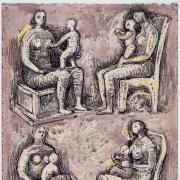Yorkshire-born Mark Forrest is the drive time DJ with new national classical station Scala Radio, presenting his show live from his farm in the Dales. He spoke to Tony Greenway

Like most farmers, Mark Forrest has a variety of chores to complete first thing in the morning. He has to tend to and feed his goats, chickens and little flock of Herdwick sheep, for instance, before walking his dogs. Then he might stop to admire the view of Swaledale and Arkengarthdale from nearby Reels Head, and remind himself how lucky he is to live in such a gorgeous part of Yorkshire.
That’s where the similarity ends, however, because Forrest later disappears into his home studio, opens his microphone and broadcasts classical music to the nation. Radio presenting has always been his first love. ‘I only ever wanted to be a DJ,’ he says, pointing out that he’s never done anything else over his 30-plus-year career. During that time he’s worked at Virgin, Heart, BBC Radio 5 Live, BBC Radio York, Talk Radio, Radio Tees, Metro, Smooth and Magic Radio; plus he did a 10 year stint as drive and breakfast host on Classic FM.
Forrest is currently in the perfect place – from both a geographical and a career standpoint – because he’s now a presenter on Scala Radio, a new national classical station which launched to much fanfare in March. His fellow Scala DJs include Anthea Turner, Penny Smith, Mark Kermode, Goldie and the station’s most famous signing, Simon Mayo, whose messy departure from Radio 2 made headline news. A classical music buff, Forrest is doubly pleased with his bosses at London-based Scala. Not only have they given him the prestigious drive time slot, they have allowed him to present it live from his farm, which he shares with his partner, Richard.

‘It’s a first for me,’ he says. ‘I put broadcast lines into the farm when we first moved here in 2007. I was working in London six or seven days a week back then and hoped I could persuade firms to let me work remotely, because I wanted to be in Yorkshire all the time. It’s taken this long for a radio station to let me do it.’
Actually, he says, that’s not quite fair: Scala management suggested he work from home. ‘It was their idea,’ he says. ‘They believe that national radio stations don’t have to be based in London. It makes my life more interesting too, and I hope it gives me more to talk about.’
Down the decades, Forrest has seen radio change significantly. At one time, being a DJ was all about being big and brash. Not any more. ‘Now it’s about being authentic, being yourself and not putting on an act,’ he says. ‘You might amplify aspects of your character, but you can’t be false because there’s so much choice for the listener. If you’re a sham, they see through it.’
Some DJs are naturals – the late, great Terry Wogan and Paul O’Grady for instance. ‘But there have been attempts to put people on radio who are famous because they’ve been on telly or written a book – and it’s not always been successful.’ Naming no names, of course.

Beverley-born and West Yorkshire-raised Forrest began his broadcasting career at Radio Tees (now called TFM) and then at Metro Radio, on the graveyard shift from 2am–6am. At the time, he was a pure and applied maths undergraduate at Newcastle University. He can still recall his very first time on live radio.
‘I remember opening the fader and speaking… and being petrified. I’d listened to so much music radio and was so obsessed with it and the techniques and tricks that presenters use to ply their trade that I knew I could do it. I just didn’t know if anyone would like what I did.’
His love of classical music came from his dad who had an extensive classical album collection, and his opera-loving aunt who ran a pub in Skipton (not that Forrest has always been an opera fan, he admits).
‘I remember being played Prokofiev’s Peter and the Wolf very early on,’ he says. ‘Meanwhile, my mum had records by Peter, Paul and Mary and Don McLean’s American Pie. So my youthful influences were classical and also English and American folk. It was when I started choosing to listen to radio myself that I was able to listen to contemporary music.’
Around the age of six or seven, he also started playing the piano that his dad had bought from the Hull Daily Mail’s classified section; and he sang in choirs, initially at Beverley Minster and then at the cathedral in Leeds.
He hopes that Scala Radio – which takes an unstuffy and informal approach to classical music – will introduce the genre to listeners who might normally be tempted to dismiss it as ‘elitist’ and change the dial to a pop station instead.
‘Classical music is about access,’ says Forrest. ‘If you experience it, maybe you’ll like it. You don’t have to get dressed up to see it at the Grand Theatre in Leeds. You might do, but it’s not a prerequisite.’
And there definitely is an audience for it, he insists. ‘At the Royal Wedding last year, Sheku Kanneh-Mason played a wonderful set on his cello while Megan and Harry were signing the register. Afterwards, he saw his streaming and downloads go through the roof. And that wasn’t from a core classical audience. That was from Joe Punter watching the wedding.’
Forrest is now living the broadcasting dream, and says that he had long wanted to settle down in the Dales. ‘There was always a wish to get back here because my family live here, and Richard’s parents were shepherds in Malhamdale,’ he says. ‘Richard was a shepherd all his life until he left to go to uni. A lot of radio presenters’ lives in London can be a bit similar; whereas I suspect the life I have is not shared by anyone else on national radio on a daily basis. I don’t want to bore people senseless with stories about the Yorkshire Dales because I could rave about it forever; but I do think it’s good to have someone on Scala who’s reflecting rural life.’
Mark Forrest presents drive time on Scala Radio weekdays, 4pm–7pm.




